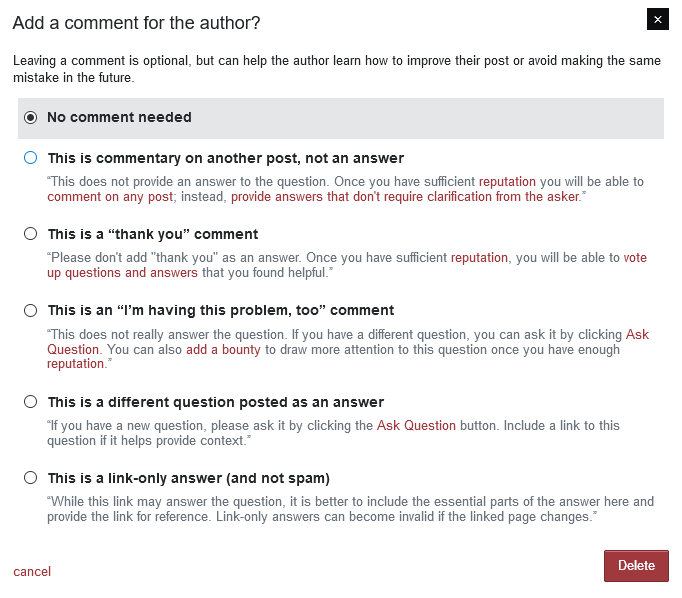Whenever looking at answers in the Low Quality Posts review queue that are real answers (i.e. should not actually be a comment, edit or new question), just bad ones, I'm a bit conflicted about choosing between saying "Looks OK" and "Recommend Deletion". Let me explain.
The answers usually fall in one of the following categories.
The answer lacks explanation or worded in a confusing manner and is only fully understandable to someone who already knew the answer beforehand.
The answer is a (partial) duplicate of an existing answer.
The answer is (essentially) a link-only answer.
The answer is wrong.
Of the reasons provided for recommending deletion, "This is a link-only answer (and not spam)" clearly fits only 3. and the other reasons clearly do not fit here, leaving only the generic "No comment needed".

Now, my feeling is that in all of these cases it would be better to just downvote the answer and leave or upvote a comment explaining why. This will keep the answer on the site but clearly mark it as unhelpful, giving everyone the opportunity to weigh in with their vote and the answerer the opportunity to improve or delete their post. Deleting on the other hand hides the answer from everyone but a relatively small number of people and likely discourages the author from posting another, improved version of the answer.
So, what I would like to do is say "Looks OK" and downvote, since the post is clearly an answer (just a bad one). In case 3. the provided option pretty clearly tells me not to do that. Furthermore the tooltip of the "Looks OK" button states "this answer doesn't seem low quality", which clearly is not the case.

Also, the interface of the review queue does not provide the option to downvote; I would have to go to the question, downvote the answer there and separately say "Looks OK" in the review queue.
All in all the system seems to push one to recommend deletion, for lack of better options with "No comment needed" (though one can of course still leave a comment), and that is what usually happens.
So, is that desirable behavior and I should stop worrying and love the bomb liberally recommend deleting questions with "no comment" that I deem to be low quality? (Are downvotes on new answers merely a tool for identifying those low quality answers in the system?) Or would it be preferable to leave the question with a downvote and push for an interface change that reflects that?
